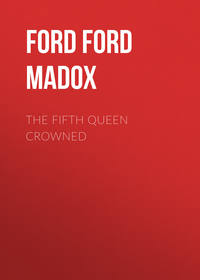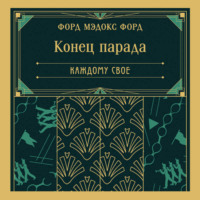 полная версия
полная версияThe Good Soldier
Is there any terrestial paradise where, amidst the whispering of the olive-leaves, people can be with whom they like and have what they like and take their ease in shadows and in coolness? Or are all men's lives like the lives of us good people – like the lives of the Ashburnhams, of the Dowells, of the Ruffords – broken, tumultuous, agonized, and unromantic, lives, periods punctuated by screams, by imbecilities, by deaths, by agonies? Who the devil knows?
For there was a great deal of imbecility about the closing scenes of the Ashburnham tragedy. Neither of those two women knew what they wanted. It was only Edward who took a perfectly clear line, and he was drunk most of the time. But, drunk or sober, he stuck to what was demanded by convention and by the traditions of his house. Nancy Rufford had to be exported to India, and Nancy Rufford hadn't to hear a word of love from him. She was exported to India and she never heard a word from Edward Ashburnham.
It was the conventional line; it was in tune with the tradition of Edward's house. I daresay it worked out for the greatest good of the body politic. Conventions and traditions, I suppose, work blindly but surely for the preservation of the normal type; for the extinction of proud, resolute and unusual individuals.
Edward was the normal man, but there was too much of the sentimentalist about him; and society does not need too many sentimentalists. Nancy was a splendid creature, but she had about her a touch of madness. Society does not need individuals with touches of madness about them. So Edward and Nancy found themselves steamrolled out and Leonora survives, the perfectly normal type, married to a man who is rather like a rabbit. For Rodney Bayham is rather like a rabbit, and I hear that Leonora is expected to have a baby in three months' time.
So those splendid and tumultuous creatures with their magnetism and their passions – those two that I really loved – have gone from this earth. It is no doubt best for them. What would Nancy have made of Edward if she had succeeded in living with him; what would Edward have made of her? For there was about Nancy a touch of cruelty – a touch of definite actual cruelty that made her desire to see people suffer. Yes, she desired to see Edward suffer. And, by God, she gave him hell.
She gave him an unimaginable hell. Those two women pursued that poor devil and flayed the skin off him as if they had done it with whips. I tell you his mind bled almost visibly. I seem to see him stand, naked to the waist, his forearms shielding his eyes, and flesh hanging from him in rags. I tell you that is no exaggeration of what I feel. It was as if Leonora and Nancy banded themselves together to do execution, for the sake of humanity, upon the body of a man who was at their disposal. They were like a couple of Sioux who had got hold of an Apache and had him well tied to a stake. I tell you there was no end to the tortures they inflicted upon him.
Night after night he would hear them talking; talking; maddened, sweating, seeking oblivion in drink, he would lie there and hear the voices going on and on. And day after day Leonora would come to him and would announce the results of their deliberations.
They were like judges debating over the sentence upon a criminal; they were like ghouls with an immobile corpse in a tomb beside them. I don't think that Leonora was any more to blame than the girl – though Leonora was the more active of the two. Leonora, as I have said, was the perfectly normal woman. I mean to say that in normal circumstances her desires were those of the woman who is needed by society. She desired children, decorum, an establishment; she desired to avoid waste, she desired to keep up appearances. She was utterly and entirely normal even in her utterly undeniable beauty. But I don't mean to say that she acted perfectly normally in this perfectly abnormal situation. All the world was mad around her and she herself, agonized, took on the complexion of a mad woman; of a woman very wicked; of the villain of the piece. What would you have? Steel is a normal, hard, polished substance. But, if you put it in a hot fire it will become red, soft, and not to be handled. If you put it in a fire still more hot it will drip away. It was like that with Leonora. She was made for normal circumstances – for Mr Rodney Bayham, who will keep a separate establishment, secretly, in Portsmouth, and make occasional trips to Paris and to Budapest.
In the case of Edward and the girl, Leonora broke and simply went all over the place. She adopted unfamiliar and therefore extraordinary and ungraceful attitudes of mind. At one moment she was all for revenge. After haranguing the girl for hours through the night she harangued for hours of the day the silent Edward. And Edward just once tripped up, and that was his undoing. Perhaps he had had too much whisky that afternoon. She asked him perpetually what he wanted. What did he want? What did he want? And all he ever answered was: "I have told you". He meant that he wanted the girl to go to her father in India as soon as her father should cable that he was ready to receive her. But just once he tripped up. To Leonora's eternal question he answered that all he desired in life was that – that he could pick himself together again and go on with his daily occupations if – the girl, being five thousand miles away, would continue to love him. He wanted nothing more, He prayed his God for nothing more. Well, he was a sentimentalist.
And the moment that she heard that, Leonora determined that the girl should not go five thousand miles away and that she should not continue to love Edward. The way she worked it was this:
She continued to tell the girl that she must belong to Edward; she was going to get a divorce; she was going to get a dissolution of marriage from Rome. But she considered it to be her duty to warn the girl of the sort of monster that Edward was. She told the girl of La Dolciquita, of Mrs Basil, of Maisie Maidan, of Florence. She spoke of the agonies that she had endured during her life with the man, who was violent, overbearing, vain, drunken, arrogant, and monstrously a prey to his sexual necessities. And, at hearing of the miseries her aunt had suffered – for Leonora once more had the aspect of an aunt to the girl – with the swift cruelty of youth and, with the swift solidarity that attaches woman to woman, the girl made her resolves. Her aunt said incessantly: "You must save Edward's life; you must save his life. All that he needs is a little period of satisfaction from you. Then he will tire of you as he has of the others. But you must save his life."
And, all the while, that wretched fellow knew – by a curious instinct that runs between human beings living together – exactly what was going on. And he remained dumb; he stretched out no finger to help himself. All that he required to keep himself a decent member of society was, that the girl, five thousand miles away, should continue to love him. They were putting a stopper upon that.
I have told you that the girl came one night to his room. And that was the real hell for him. That was the picture that never left his imagination – the girl, in the dim light, rising up at the foot of his bed. He said that it seemed to have a greenish sort of effect as if there were a greenish tinge in the shadows of the tall bedposts that framed her body. And she looked at him with her straight eyes of an unflinching cruelty and she said: "I am ready to belong to you – to save your life."
He answered: "I don't want it; I don't want it; I don't want it."
And he says that he didn't want it; that he would have hated himself; that it was unthinkable. And all the while he had the immense temptation to do the unthinkable thing, not from the physical desire but because of a mental certitude. He was certain that if she had once submitted to him she would remain his for ever. He knew that.
She was thinking that her aunt had said he had desired her to love him from a distance of five thousand miles. She said: "I can never love you now I know the kind of man you are. I will belong to you to save your life. But I can never love you."
It was a fantastic display of cruelty. She didn't in the least know what it meant – to belong to a man. But, at that Edward pulled himself together. He spoke in his normal tones; gruff, husky, overbearing, as he would have done to a servant or to a horse.
"Go back to your room," he said. "Go back to your room and go to sleep. This is all nonsense."
They were baffled, those two women.
And then I came on the scene.
VI
MY coming on the scene certainly calmed things down – for the whole fortnight that intervened between my arrival and the girl's departure. I don't mean to say that the endless talking did not go on at night or that Leonora did not send me out with the girl and, in the interval, give Edward a hell of a time. Having discovered what he wanted – that the girl should go five thousand miles away and love him steadfastly as people do in sentimental novels, she was determined to smash that aspiration. And she repeated to Edward in every possible tone that the girl did not love him; that the girl detested him for his brutality, his overbearingness, his drinking habits. She pointed out that Edward in the girl's eyes, was already pledged three or four deep. He was pledged to Leonora herself, to Mrs Basil, and to the memories of Maisie Maidan and to Florence. Edward never said anything.
Did the girl love Edward, or didn't she? I don't know. At that time I daresay she didn't though she certainly had done so before Leonora had got to work upon his reputation. She certainly had loved him for what I call the public side of his record – for his good soldiering, for his saving lives at sea, for the excellent landlord that he was and the good sportsman. But it is quite possible that all those things came to appear as nothing in her eyes when she discovered that he wasn't a good husband. For, though women, as I see them, have little or no feeling of responsibility towards a county or a country or a career – although they may be entirely lacking in any kind of communal solidarity – they have an immense and automatically working instinct that attaches them to the interest of womanhood. It is, of course, possible for any woman to cut out and to carry off any other woman's husband or lover. But I rather think that a woman will only do this if she has reason to believe that the other woman has given her husband a bad time. I am certain that if she thinks the man has been a brute to his wife she will, with her instinctive feeling for suffering femininity, "put him back", as the saying is. I don't attach any particular importance to these generalizations of mine. They may be right, they may be wrong; I am only an ageing American with very little knowledge of life. You may take my generalizations or leave them. But I am pretty certain that I am right in the case of Nancy Rufford – that she had loved Edward Ashburnham very deeply and tenderly.
It is nothing to the point that she let him have it good and strong as soon as she discovered that he had been unfaithful to Leonora and that his public services had cost more than Leonora thought they ought to have cost. Nancy would be bound to let him have it good and strong then. She would owe that to feminine public opinion; she would be driven to it by the instinct for self-preservation, since she might well imagine that if Edward had been unfaithful to Leonora, to Mrs Basil and to the memories of the other two, he might be unfaithful to herself. And, no doubt, she had her share of the sex instinct that makes women be intolerably cruel to the beloved person. Anyhow, I don't know whether, at this point, Nancy Rufford loved Edward Ashburnham. I don't know whether she even loved him when, on getting, at Aden, the news of his suicide she went mad. Because that may just as well have been for the sake of Leonora as for the sake of Edward. Or it may have been for the sake of both of them. I don't know. I know nothing. I am very tired. Leonora held passionately the doctrine that the girl didn't love Edward. She wanted desperately to believe that. It was a doctrine as necessary to her existence as a belief in the personal immortality of the soul. She said that it was impossible that Nancy could have loved Edward after she had given the girl her view of Edward's career and character. Edward, on the other hand, believed maunderingly that some essential attractiveness in himself must have made the girl continue to go on loving him – to go on loving him, as it were, in underneath her official aspect of hatred. He thought she only pretended to hate him in order to save her face and he thought that her quite atrocious telegram from Brindisi was only another attempt to do that – to prove that she had feelings creditable to a member of the feminine commonweal. I don't know. I leave it to you. There is another point that worries me a good deal in the aspects of this sad affair. Leonora says that, in desiring that the girl should go five thousand miles away and yet continue to love him, Edward was a monster of selfishness. He was desiring the ruin of a young life. Edward on the other hand put it to me that, supposing that the girl's love was a necessity to his existence, and, if he did nothing by word or by action to keep Nancy's love alive, he couldn't be called selfish. Leonora replied that showed he had an abominably selfish nature even though his actions might be perfectly correct. I can't make out which of them was right. I leave it to you.
It is, at any rate, certain that Edward's actions were perfectly – were monstrously, were cruelly – correct. He sat still and let Leonora take away his character, and let Leonora damn him to deepest hell, without stirring a finger. I daresay he was a fool; I don't see what object there was in letting the girl think worse of him than was necessary. Still there it is. And there it is also that all those three presented to the world the spectacle of being the best of good people. I assure you that during my stay for that fortnight in that fine old house, I never so much as noticed a single thing that could have affected that good opinion. And even when I look back, knowing the circumstances, I can't remember a single thing any of them said that could have betrayed them. I can't remember, right up to the dinner, when Leonora read out that telegram – not the tremor of an eyelash, not the shaking of a hand. It was just a pleasant country house-party.
And Leonora kept it up jolly well, for even longer than that – she kept it up as far as I was concerned until eight days after Edward's funeral. Immediately after that particular dinner – the dinner at which I received the announcement that Nancy was going to leave for India on the following day – I asked Leonora to let me have a word with her. She took me into her little sitting-room and I then said – I spare you the record of my emotions – that she was aware that I wished to marry Nancy; that she had seemed to favour my suit and that it appeared to be rather a waste of money upon tickets and rather a waste of time upon travel to let the girl go to India if Leonora thought that there was any chance of her marrying me.
And Leonora, I assure you, was the absolutely perfect British matron. She said that she quite favoured my suit; that she could not desire for the girl a better husband; but that she considered that the girl ought to see a little more of life before taking such an important step. Yes, Leonora used the words "taking such an important step". She was perfect. Actually, I think she would have liked the girl to marry me enough but my programme included the buying of the Kershaw's house about a mile away upon the Fordingbridge road, and settling down there with the girl. That didn't at all suit Leonora. She didn't want to have the girl within a mile and a half of Edward for the rest of their lives. Still, I think she might have managed to let me know, in some periphrasis or other, that I might have the girl if I would take her to Philadelphia or Timbuctoo. I loved Nancy very much – and Leonora knew it. However, I left it at that. I left it with the understanding that Nancy was going away to India on probation. It seemed to me a perfectly reasonable arrangement and I am a reasonable sort of man. I simply said that I should follow Nancy out to India after six months' time or so. Or, perhaps, after a year. Well, you see, I did follow Nancy out to India after a year… I must confess to having felt a little angry with Leonora for not having warned me earlier that the girl would be going. I took it as one of the queer, not very straight methods that Roman Catholics seem to adopt in dealing with matters of this world. I took it that Leonora had been afraid I should propose to the girl or, at any rate, have made considerably greater advances to her than I did, if I had known earlier that she was going away so soon. Perhaps Leonora was right; perhaps Roman Catholics, with their queer, shifty ways, are always right. They are dealing with the queer, shifty thing that is human nature. For it is quite possible that, if I had known Nancy was going away so soon, I should have tried making love to her. And that would have produced another complication. It may have been just as well.
It is queer the fantastic things that quite good people will do in order to keep up their appearance of calm pococurantism. For Edward Ashburnham and his wife called me half the world over in order to sit on the back seat of a dog-cart whilst Edward drove the girl to the railway station from which she was to take her departure to India. They wanted, I suppose, to have a witness of the calmness of that function. The girl's luggage had been already packed and sent off before. Her berth on the steamer had been taken. They had timed it all so exactly that it went like clockwork. They had known the date upon which Colonel Rufford would get Edward's letter and they had known almost exactly the hour at which they would receive his telegram asking his daughter to come to him. It had all been quite beautifully and quite mercilessly arranged, by Edward himself. They gave Colonel Rufford, as a reason for telegraphing, the fact that Mrs Colonel Somebody or other would be travelling by that ship and that she would serve as an efficient chaperon for the girl. It was a most amazing business, and I think that it would have been better in the eyes of God if they had all attempted to gouge out each other's eyes with carving knives. But they were "good people". After my interview with Leonora I went desultorily into Edward's gun-room. I didn't know where the girl was and I thought I might find her there. I suppose I had a vague idea of proposing to her in spite of Leonora. So, I presume, I don't come of quite such good people as the Ashburnhams. Edward was lounging in his chair smoking a cigar and he said nothing for quite five minutes. The candles glowed in the green shades; the reflections were green in the glasses of the book-cases that held guns and fishing-rods. Over the mantelpiece was the brownish picture of the white horse. Those were the quietest moments that I have ever known. Then, suddenly, Edward looked me straight in the eyes and said:
"Look here, old man, I wish you would drive with Nancy and me to the station tomorrow."
I said that of course I would drive with him and Nancy to the station on the morrow. He lay there for a long time, looking along the line of his knees at the fluttering fire, and then suddenly, in a perfectly calm voice, and without lifting his eyes, he said:
"I am so desperately in love with Nancy Rufford that I am dying of it."
Poor devil – he hadn't meant to speak of it. But I guess he just had to speak to somebody and I appeared to be like a woman or a solicitor. He talked all night.
Well, he carried out the programme to the last breath.
It was a very clear winter morning, with a good deal of frost in it. The sun was quite bright, the winding road between the heather and the bracken was very hard. I sat on the back-seat of the dog-cart; Nancy was beside Edward. They talked about the way the cob went; Edward pointed out with the whip a cluster of deer upon a coombe three-quarters of a mile away. We passed the hounds in the level bit of road beside the high trees going into Fordingbridge and Edward pulled up the dog-cart so that Nancy might say good-bye to the huntsman and cap him a last sovereign. She had ridden with those hounds ever since she had been thirteen.
The train was five minutes late and they imagined that that was because it was market-day at Swindon or wherever the train came from. That was the sort of thing they talked about. The train came in; Edward found her a first-class carriage with an elderly woman in it. The girl entered the carriage, Edward closed the door and then she put out her hand to shake mine. There was upon those people's faces no expression of any kind whatever. The signal for the train's departure was a very bright red; that is about as passionate a statement as I can get into that scene. She was not looking her best; she had on a cap of brown fur that did not very well match her hair. She said:
"So long," to Edward.
Edward answered: "So long."
He swung round on his heel and, large, slouching, and walking with a heavy deliberate pace, he went out of the station. I followed him and got up beside him in the high dog-cart. It was the most horrible performance I have ever seen.
And, after that, a holy peace, like the peace of God which passes all understanding, descended upon Branshaw Teleragh. Leonora went about her daily duties with a sort of triumphant smile – a very faint smile, but quite triumphant. I guess she had so long since given up any idea of getting her man back that it was enough for her to have got the girl out of the house and well cured of her infatuation. Once, in the hall, when Leonora was going out, Edward said, beneath his breath – but I just caught the words:
"Thou hast conquered, O pale Galilean." It was like his sentimentality to quote Swinburne. But he was perfectly quiet and he had given up drinking. The only thing that he ever said to me after that drive to the station was:
"It's very odd. I think I ought to tell you, Dowell, that I haven't any feelings at all about the girl now it's all over. Don't you worry about me. I'm all right." A long time afterwards he said: "I guess it was only a flash in the pan." He began to look after the estates again; he took all that trouble over getting off the gardener's daughter who had murdered her baby. He shook hands smilingly with every farmer in the market-place. He addressed two political meetings; he hunted twice. Leonora made him a frightful scene about spending the two hundred pounds on getting the gardener's daughter acquitted. Everything went on as if the girl had never existed. It was very still weather.
Well, that is the end of the story. And, when I come to look at it I see that it is a happy ending with wedding bells and all. The villains – for obviously Edward and the girl were villains – have been punished by suicide and madness. The heroine – the perfectly normal, virtuous and slightly deceitful heroine – has become the happy wife of a perfectly normal, virtuous and slightly deceitful husband. She will shortly become a mother of a perfectly normal, virtuous slightly deceitful son or daughter. A happy ending, that is what it works out at.
I cannot conceal from myself the fact that I now dislike Leonora. Without doubt I am jealous of Rodney Bayham. But I don't know whether it is merely a jealousy arising from the fact that I desired myself to possess Leonora or whether it is because to her were sacrificed the only two persons that I have ever really loved – Edward Ashburnham and Nancy Rufford. In order to set her up in a modern mansion, replete with every convenience and dominated by a quite respectable and eminently economical master of the house, it was necessary that Edward and Nancy Rufford should become, for me at least, no more than tragic shades.
I seem to see poor Edward, naked and reclining amidst darkness, upon cold rocks, like one of the ancient Greek damned, in Tartarus or wherever it was.
And as for Nancy… Well, yesterday at lunch she said suddenly:
"Shuttlecocks!"
And she repeated the word "shuttlecocks" three times. I know what was passing in her mind, if she can be said to have a mind, for Leonora has told me that, once, the poor girl said she felt like a shuttlecock being tossed backwards and forwards between the violent personalities of Edward and his wife. Leonora, she said, was always trying to deliver her over to Edward, and Edward tacitly and silently forced her back again. And the odd thing was that Edward himself considered that those two women used him like a shuttlecock. Or, rather, he said that they sent him backwards and forwards like a blooming parcel that someone didn't want to pay the postage on. And Leonora also imagined that Edward and Nancy picked her up and threw her down as suited their purely vagrant moods. So there you have the pretty picture. Mind, I am not preaching anything contrary to accepted morality. I am not advocating free love in this or any other case. Society must go on, I suppose, and society can only exist if the normal, if the virtuous, and the slightly deceitful flourish, and if the passionate, the headstrong, and the too-truthful are condemned to suicide and to madness. But I guess that I myself, in my fainter way, come into the category of the passionate, of the headstrong, and the too-truthful. For I can't conceal from myself the fact that I loved Edward Ashburnham – and that I love him because he was just myself. If I had had the courage and virility and possibly also the physique of Edward Ashburnham I should, I fancy, have done much what he did. He seems to me like a large elder brother who took me out on several excursions and did many dashing things whilst I just watched him robbing the orchards, from a distance. And, you see, I am just as much of a sentimentalist as he was…









